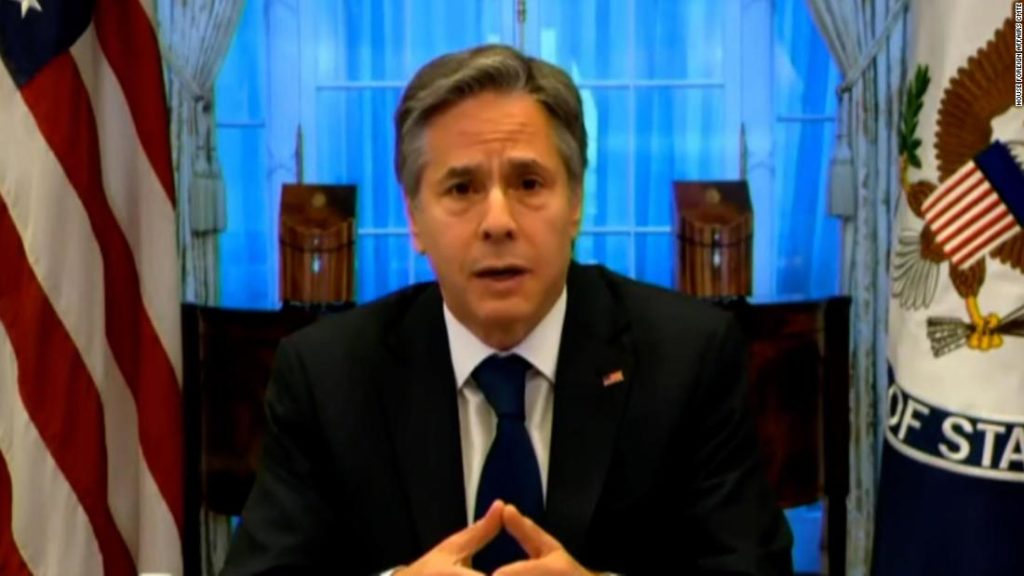The top US diplomat told the House Foreign Affairs Committee that steps the administration is looking at include asking Congress to increase the number of visas for these Afghans and the possibility of humanitarian parole — a status that allows those under immediate threat to seek refuge in the US.
“We’re considering every option,” the top US diplomat said.
But Blinken didn’t offer a direct answer when lawmakers pressed him on the need to consider evacuating the thousands of Afghans waiting for Special Immigrant Visas to a third country where they could be safe as they waited for visas.
Congressman Mike McCaul of Texas, the lead Republican on the committee, called on the Biden administration to evacuate any person in Afghanistan who has reached a “significant stage” in the vetting process for a Special Immigrant Visa to a third country while they await approval, and he pressed Blinken for details on how the administration is handling this challenge as the US troop withdrawal deadline of September 11 is just months away.
‘Frustrated’
“Mr. Secretary, the clock is ticking, and the Taliban are on the march. And that’s why I’m calling for this administration to evacuate any person who has reached a significant stage in the security vetting process to a third country to finish their visa processing before the US completes its military retrograde. The time for platitudes and vague promises are over,” McCaul told Blinken. “We need action, and we need it yesterday.”
Advocates who have been urging the administration to speed up this process say the commitments Blinken made are not enough.
“Processing 1,000 SIVs a month does not bring the admin even close to getting everyone out by September. At that pace it would still be a year and a half before processing the full backlog,” said James Miervaldis, the chairman of the group No One Left Behind, which describes itself as an all-volunteer organization working to support Special Immigrant Visa recipients.
At the Pentagon, Gen. Kenneth McKenzie, commander of US Central Command, which oversees the Middle East region, told reporters Monday during a phone briefing that the US troop withdrawal from Afghanistan is “about halfway finished.”
“We’re on pace, and it’s continuing very smoothly,” McKenzie said. Asked if there’s a point at which the military needs to make a decision to start evacuating Afghan visa applicants or whether it can do that even after September, he said: “We will have the capability to exercise whatever orders we’re given. Clearly it’s easier sometimes than others, but the United States military has remarkable capabilities for this type of thing. We can do whatever is going to be necessary, whenever it would be necessary.”
He also noted that the administration had an allotment of 26,000 of the visas and has used 15,000, leaving it with 11,000 visas to accommodate the 18,000 applicants still in the pipeline.
“We’re asking for your support to add 8,000 to our cap so that we can accommodate everyone, and then be able to come back to you if we need more,” Blinken said.
As lawmakers worried aloud about the fate of Afghan interpreters and others who assisted the US, Blinken said that increased violence against those seeking Special Immigrant Visas may not occur immediately after US troops leave the country and argued that the US will still have significant leverage.
‘Not withdrawing from Afghanistan’
“Even as we’re withdrawing our forces, we are not withdrawing from Afghanistan,” Blinken told a House Appropriations subcommittee Monday afternoon. “We are determined to sustain a strong embassy presence, programs to support Afghanistan, its people, and its government, economic development, humanitarian, the security forces. All of that will remain. We’re working with other partners to make sure that they remain as well, and that we stay deeply engaged in supporting the government, supporting the people.”
“And whatever happens in Afghanistan, if there is a significant deterioration, in security, that could well happen, we discussed this before, I don’t think it’s going to be something that happens from a Friday to a Monday,” Blinken told the appropriations subcommittee, “so I wouldn’t necessarily equate the departure of our forces in July, August or by early September with some kind of immediate deterioration in the situation.”
CNN’s Ellie Kaufman and Corey James contributed to this report.
You may also like
-
Afghanistan: Civilian casualties hit record high amid US withdrawal, UN says
-
How Taiwan is trying to defend against a cyber ‘World War III’
-
Pandemic travel news this week: Quarantine escapes and airplane disguises
-
Why would anyone trust Brexit Britain again?
-
Black fungus: A second crisis is killing survivors of India’s worst Covid wave

